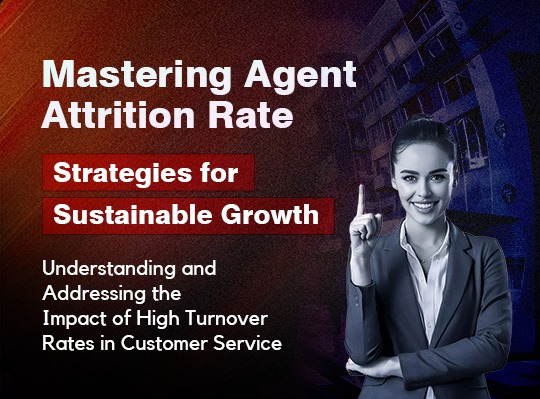
In the dynamic landscape of customer service, maintaining a low agent attrition rate is paramount for sustained success. Agent attrition rate refers to the percentage of customer service representatives who leave a company within a certain period. High attrition rates can significantly impact a company’s bottom line, disrupt workflow, and compromise customer satisfaction. To mitigate this challenge, organizations must adopt proactive strategies that prioritize employee well-being, foster a supportive work environment, and promote continuous learning and development.
Understanding Agent Attrition Rate
Agent attrition rate is more than just a metric; it reflects the overall health of a customer service team. High turnover rates indicate underlying issues that need to be addressed promptly. These issues can range from inadequate training and unrealistic workload to poor management and lack of career advancement opportunities. Recognizing the root causes of attrition is the first step toward implementing effective solutions.
Cultivating a Supportive Work Environment
A supportive work environment is the cornerstone of employee retention. When agents feel valued, respected, and heard, they are more likely to remain committed to their roles. Companies can foster a positive workplace culture by:
1. Open Communication Channels:
Encourage transparent communication between management and agents. Regular feedback sessions, suggestion boxes, and team meetings provide avenues for voicing concerns and implementing constructive changes.
2. Emphasizing Work-Life Balance:
Strive to maintain a healthy work-life balance for agents. Implement flexible scheduling, remote work options, and wellness programs to help employees manage their professional and personal lives effectively.
3. Recognition and Rewards:
Acknowledge and reward agents for their hard work and achievements. Whether through bonuses, incentives, or public recognition, appreciation fosters a sense of belonging and motivates employees to excel.


Investing in Training and Development
Comprehensive training and ongoing development opportunities are essential for empowering agents to succeed in their roles. A well-trained workforce not only delivers superior customer service but also feels more confident and competent in their positions. Here’s how companies can invest in agent training and development:
1. Initial Training Programs:
Implement robust onboarding programs that equip new agents with the knowledge, skills, and tools they need to excel in their roles from day one. Cover topics such as product knowledge, communication techniques, and problem-solving strategies.
2. Continuous Learning:
Offer ongoing training and professional development opportunities to keep agents engaged and informed. This could include workshops, webinars, e-learning modules, and cross-training initiatives that broaden agents’ skill sets and career prospects.
3. Mentorship Programs:
Pair new agents with experienced mentors who can provide guidance, support, and encouragement as they navigate their roles. Mentorship fosters a sense of camaraderie and facilitates knowledge sharing within the team.
Implementing Performance Management Systems
Performance management systems play a crucial role in monitoring agent performance, identifying areas for improvement, and providing constructive feedback. By implementing effective performance management strategies, companies can optimize agent productivity and job satisfaction. Key components of performance management include:
1. Goal Setting:
Collaboratively set clear, achievable goals for each agent based on their strengths, weaknesses, and career aspirations. Regularly revisit these goals to track progress and make adjustments as needed.
2. Regular Feedback:
Provide timely, specific feedback to agents on their performance, highlighting areas of excellence and areas for improvement. Constructive feedback fosters growth and empowers agents to enhance their skills and performance.
3. Performance Reviews:
Conduct regular performance reviews to assess agent performance against predefined metrics and goals. Use these reviews as opportunities to recognize achievements, address concerns, and outline development plans for the future.

Conclusion
In conclusion, securing a lower agent attrition rate requires a multifaceted approach that addresses the root causes of turnover and prioritizes employee satisfaction and development. By cultivating a supportive work environment, investing in training and development, and implementing effective performance management systems, companies can foster a loyal, motivated workforce capable of delivering exceptional customer service. Remember, the key to sustainable growth lies in nurturing your most valuable asset—your employees. Incorporating these strategies will undoubtedly contribute to lowering your agent attrition rate and fostering a culture of success within your customer service team. By focusing on the well-being and development of your agents, you not only reduce turnover but also enhance productivity, customer satisfaction, and overall business performance.




